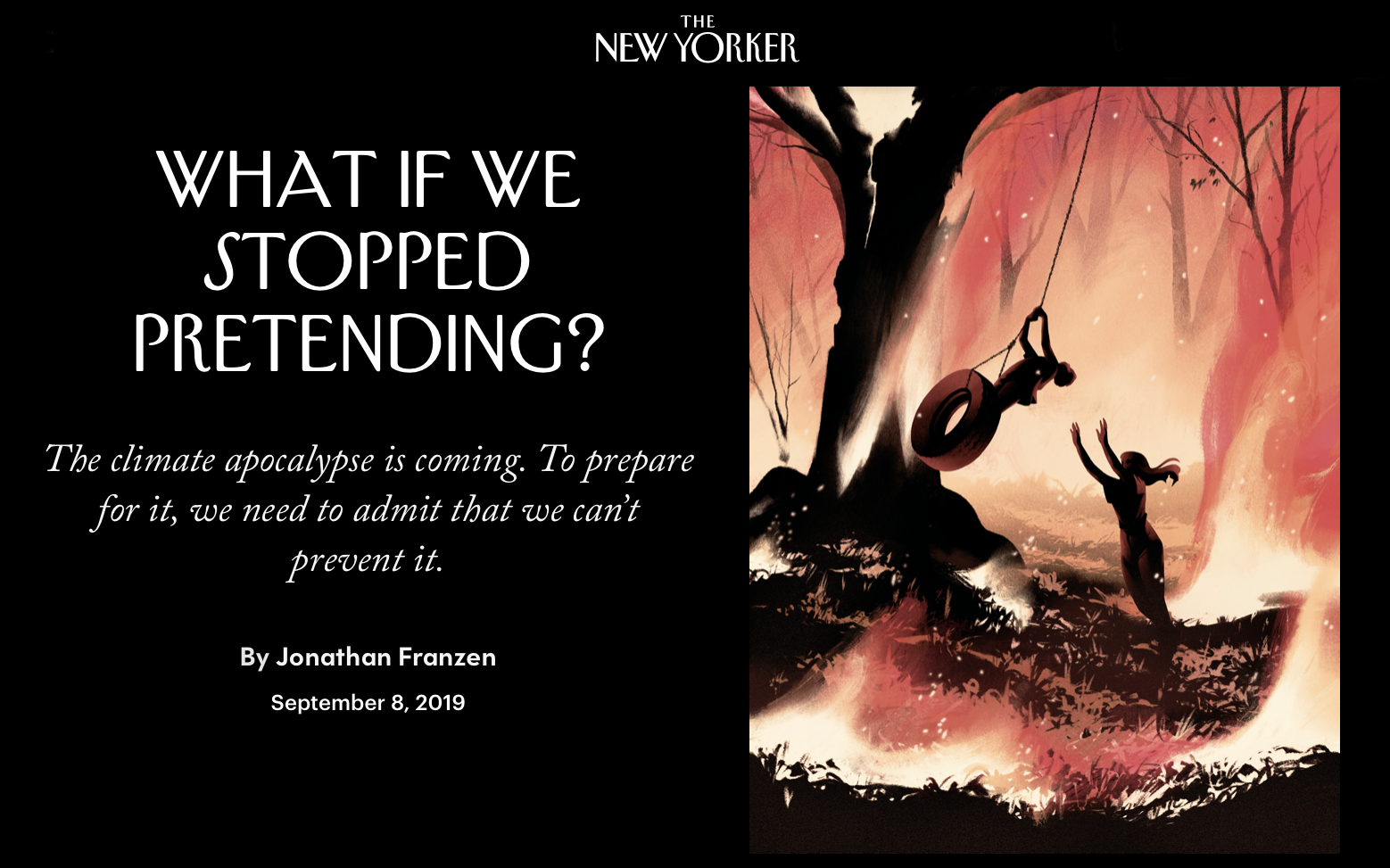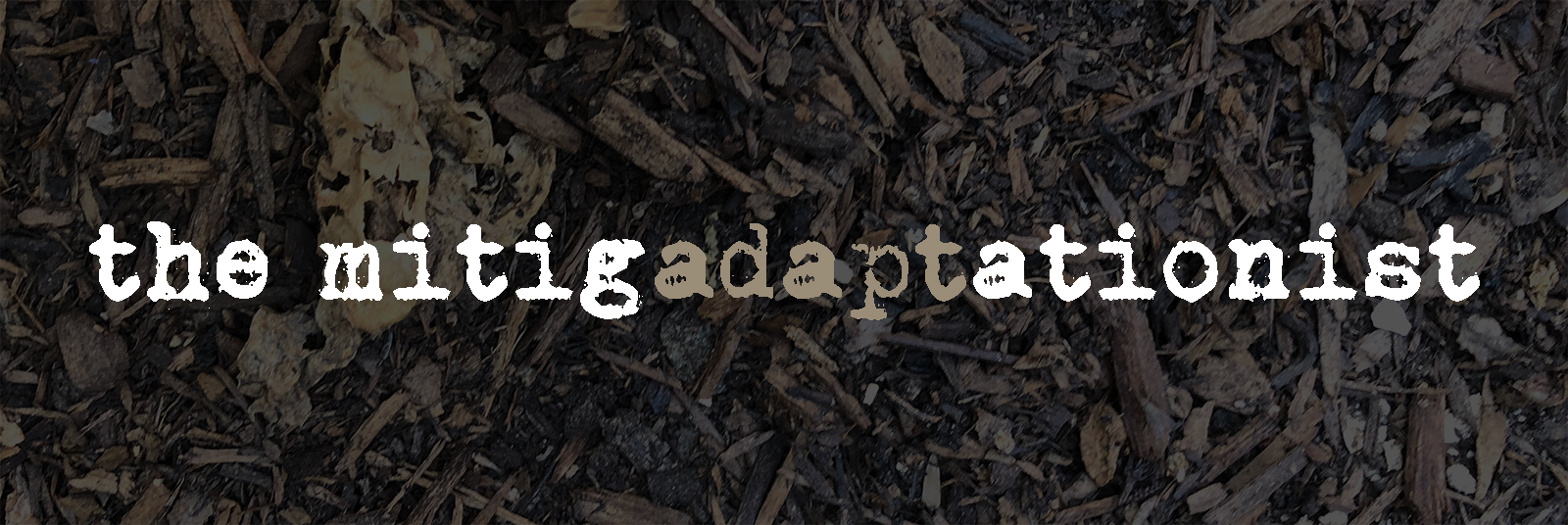
Without permission but with gratitude.
It’s fascinating to watch what happens when someone suggests we adapt to climate change “instead of” fighting it, especially when that person is one of this beleaguered globe’s Reigning People of Letters.
The RPOL in this case is Corrections author Jonathan Franzen, whose essay “What If We Stopped Pretending” in this week’s New Yorker declares that the time to dispense with the hopeless fantasy of preventing climate change has come. If preventing the +2°c point-of-no-return is now out of reach, it’s time to flip the switch of our limited attention span to the improvement of the lives of the people and animals who will remain on this doomed island.
Look. It’s going to be controversial to write anything at all about climate change. If “the sun is rising” were part of the pantheon of climate-change discourse, making that observation would inspire a significant portion of your listeners to roll their most ironic eyes or whip out their sharpest knives — and at the end of the day, you’d keep the sunset to yourself. But this question of adaptation is even stickier than most climate topics, and Franzen stumbles right out of the gate by setting up a rigid binary vision:
If you care about the planet, and about the people and animals who live on it, there are two ways to think about this. You can keep on hoping that catastrophe is preventable, and feel ever more frustrated or enraged by the world’s inaction. Or you can accept that disaster is coming, and begin to rethink what it means to have hope.
Why someone would reduce any complex thing to such a simple equation is beyond me. Especially a beloved RPOL, and especially in a subject where binaries (ecology vs. economy!) have been so fraught with peril for so long.
As a then-innocent planet-Earth enthusiast, I was introduced in earnest to the epic battle between climate adaptation and mitigation in a February 2007 article in Nature by Pielke, Prins, Rayner, and Sarewitz — yeah, those guys — called “Climate Change 2007: Lifting the Taboo on Adaptation.” In that article, the authors informed a bewildered younger me that in the 1980s, adaptation had been considered “an important option for society,” but that…
for much of the past two decades the mere idea of adapting to climate change became problematic for those advocating emissions reductions, and was treated “with the same distaste that the religious right reserves for sex education in schools. That is, both constitute ethical compromises that in any case will only encourage dangerous experimentation with the undesired behaviour”. Indeed, former US vice-president Al Gore forcefully declared his opposition to adaptation in 1992, explaining that it represented a “kind of laziness, an arrogant faith in our ability to react in time to save our skins.”
This seemed surprisingly combative and polarized for grown-ups working on existential problems, but as someone who’s worked in history, international development, and the arts, I’m no stranger to professional combatants who sharpen their teeth and fingernails alongside the kitchen knives. But climate change is such an intimidating subject that it forges a special spirit of conflict. So, 12 years later, here we are, still forced to argue that it’s happening at all, and as a result of this exhausting struggle under the distorting effects of the gaslights, we continue to bicker over critical issues wearily, with whatever energy that remains.
Franzen visits the Green New Deal, dismissing political solutions based on his foregone conclusion that since we have never exhibited global and resolute will to act on climate change before, we will not now. And even if we could act, we need to admit to ourselves that we have already passed the +2°c point of no return, especially considering new British projections published last month in Scientific American.
And besides, ornery Americans and others who won’t even admit there is a problem would have to deliberately sacrifice things — “Every day, instead of thinking about breakfast, they have to think about death” — so it is high time to just give up on natural and instead devote our limited cranial bandwidth to hunkering down in the world we’ve ruined.
He agrees that reducing emissions remains an ethical virtue, but:
Every billion dollars spent on high-speed trains, which may or may not be suitable for North America, is a billion not banked for disaster preparedness, reparations to inundated countries, or future humanitarian relief. Every renewable-energy mega-project that destroys a living ecosystem—the “green” energy development now occurring in Kenya’s national parks, the giant hydroelectric projects in Brazil, the construction of solar farms in open spaces, rather than in settled areas—erodes the resilience of a natural world already fighting for its life. Soil and water depletion, overuse of pesticides, the devastation of world fisheries—collective will is needed for these problems, too, and, unlike the problem of carbon, they’re within our power to solve. As a bonus, many low-tech conservation actions (restoring forests, preserving grasslands, eating less meat) can reduce our carbon footprint as effectively as massive industrial changes.
So he rejects destructive things in favor of constructive things, fair enough, but then since it’s his football he gets to choose just what kind of contstructive things to replace them with: he favors strong natural and human systems, alternate “climate actions” that will help ready us for a kinder, gentler post-apocalypse… for a time when we will sit down in the blistering heat of our resilient garden and thank god we didn’t build those renewable-energy mega-projects.
***
So Franzen wrote about climate change. And lo, social media did erupt in righteous indignation — as Vox summarizes conveniently here — for the crimes of bad science, wrong politics, and oversimplified psychology. New York magazineshares his desperately bleak vision, but takes him to task for scientific oversimplifications within the bleakness. It’s a very good criticism, since Franzen bases a significant chunk of his hopeless vision on the scientific position that since we’ve already gone beyond the tipping point, there’s no mitigating or slowing down a process that ends with the climate completely upside-down — and so, it’s time to start planning beyond recognizable natural systems and get ready to live in perpetual cyclones or whatever awaits us on the other side of the world.
Franzen’s binary thinking never lets him back on the rails, but still, he isn’t far from the mark. We do have to conduct his preferred interventions, such as “traditional local farming […] strong communities […] Kindness to neighbors and respect for the land—nurturing healthy soil, wisely managing water, caring for pollinators—”
Yes. Yes we do. But above all we need to face the coming decades with a coherent vision that recognizes that just as there is no binary choice between ecology and economy, there is no binary choice between adapt and mitigate either.
We have to adapt and mitigate, until those two are the same thing. Well-designed solutions do both: if they reduce emissions and other impacts before we reach +2°c, they will be more efficient and sustainable in the times afterward. Likewise, if localized community systems will be better for living after the tipping point, they will probably also be good ingredients of a humane, holistic attempt to mitigate climate change to whatever degree is still possible.
The popular meme comes to mind — “ok, take for granted there IS no global warming. Isn’t it still a good idea to reduce diesel emissions in vulnerable communities, reduce acid rain, and preserve the Canadian forests destroyed by tar sands extraction?”
We can all agree that it is. And likewise, what is the downside of any climate-change mitigation measure if it’s done properly to begin with? If the alternative is business-as-usual oil extraction or mass-consumption and waste, it’s time to fund it.

0 Comments